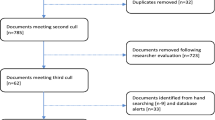Abstract
Although most junior faculty are expected to produce research, studies suggest that mentorship and support for promoting their research careers may be limited. Accordingly, in 2003, the School Psychology Research Collaboration Conference (SPRCC) was developed as an opportunity for early career scholars to establish scholarly networks and collaborate with peers and top researchers in the field of school psychology. The conference was intended to both facilitate important and collaborative research, while also enhancing the productivity among early career participants. The purpose of this study was to evaluate the outcomes of the SPRCC on the research trajectories of 147 participants between 2003 and 2015. The findings indicate that SPRCC has positive research outcomes, especially for participants from institutions with the highest research activity, those with more publications prior to SPRCC, and males. Implications for the field and ideas for future research are discussed.



Similar content being viewed by others
References
American Psychological Association. (1986). 1985–1986: Faculty salaries in graduate departments of psychology [Unpublished analysis]. Washington: Author.
Ceci, S. J., Ginther, D. K., Kahn, S., & Williams, W. M. (2014). Women in academic science: A changing landscape. Psychological Science in the Public Interest, 15, 75–141. https://doi.org/10.1177/1529100614541236.
Clopton, K. L., & Haselhuhn, C. W. (2009). School psychology trainer shortage in the USA: Current status and projections for the future. School Psychology International, 30, 24–42. https://doi.org/10.1177/0143034308101848.
Feldman, M. D., Arean, P. A., Marshall, S. J., Lovett, M., & O’Sullivan, P. (2010). Does mentoring matter?: Results from a survey of faculty mentees at a large health sciences university. Medical Education Online, 15. https://doi.org/10.3402/meo.v15i0.5063.
Gordon, R. (2012). On community in the midst of hierarchy (and hierarchy in the midst of community). In G. y. Muhs, N. Y. Flores, C. G. González, & A. P. Harris (Eds.), Presumed Incompetent: The intersections of race and class for women in academia. Boulder: University Press of Colorado.
Grapin, S. L., Kranzler, J. H., & Daley, M. L. (2013). Scholarly productivity and impact of school psychology faculty in APA-accredited programs. Psychology in the Schools, 50, 87–101. https://doi.org/10.1002/pits.21658.
Hagedorn, L. S. (2001). Gender differences in faculty productivity, satisfaction, and salary: What really separates us? ERIC research reports no. ED464548. Retrieved on December 14, 2017 from http://eric.ed.gov/
Hamilton, K. (2005). Getting off the burnout track? Diverse Issues in Higher Education, 22, 26–31.
Jimerson, S. R. (2002). Announcing a school psychology research collaboration conference, 2003. Communiqué, 30(8), 6.
Jimerson S. R. & Abidin, R. (2000). Proposal for a National School Psychology Research Collaboration Conference: Submitted to the Society for the Study of School Psychology. Available from Jimerson@education.ucsb.edu
Jimerson, S. R., & Albers, C. A. (2007). The school psychology research collaboration conference: Reflections on the past, present, and future. School Psychologist, 61, 76–80.
Jimerson, S. R., & VanDerHeyden, A. M. (2004). 2003 school psychology research collaboration conference: The importance of research in the future of school psychology. Communiqué, 32(5), 36.
Joy, S. (2006). What should I be doing, and where are they doing it? Scholarly productivity of academic psychologists. Perspectives on Psychological Science, 1, 346–364.
Martinez, R., Floyd, R., & Erichsen, L. (2011). Strategies and attributes of highly productive scholars and contributors to the school psychology literature: Recommendations for increasing scholarly productivity. Journal of School Psychology, 49, 691–720.
Montgomery, B., Dodson, J., & Johnson, S. (2014). Guiding the way: Mentoring graduate students and junior faculty for sustainable academic careers. SAGE Open, 4, 1–11. https://doi.org/10.1177/2158244014558043.
Rush, C., & Wheeler, J. (2011). Enhancing junior faculty research productivity through multi-institution collaboration: Participants’ impressions of the School Psychology Research Collaboration Conference. The Journal of Canadian School Psychology, 26, 220–240. https://doi.org/10.1177/0829573511413552.
Shapiro, E., & Blom-Hoffman, J. (2004). Mentoring, modeling, and money. The 3 Ms of producing academics. School Psychology Quarterly, 19, 365–381. https://doi.org/10.1521/scpq.19.4.365.53502.
Sorcinelli, M. D. (1992). New and junior faculty stress: Research and responses. In M. D. Sorcinelli & A. E. Austin (Eds.), Developing new and junior faculty: New directions for teaching and learning, no. 50 (pp. 27–37). San Francisco: Jossey-Bass.
Watkins, M. W., & Chan-Park, C. (2015). The research impact of school psychology faculty. Journal of School Psychology, 53, 231–241. https://doi.org/10.1016/j.jsp.2015.03.003.
Weisshaar, K. (2017). Publish and perish? An assessment of gender gaps in promotion to tenure in academia. Social Forces, 96, 529–560. https://doi.org/10.1093/sf/sox052.
Wicherski, M., Hamp, A., Christidis, P., & Stamm, K. (2014). 2013–2014: Faculty salaries in graduate departments of psychology. Retrieved from www.apa.org/workforce/publications/13-fac-sal/index.aspx
Funding
This study was funded by the Society for the Study of School Psychology.
Author information
Authors and Affiliations
Corresponding author
Ethics declarations
Conflict of Interest
The authors declare that they have no conflict of interest.
Ethical Approval
This article does not contain any studies with human participants or animals performed by any of the authors.
Additional information
Publisher’s Note
Springer Nature remains neutral with regard to jurisdictional claims in published maps and institutional affiliations.
The current study was supported by funds from the Society for the Study of School Psychology (SSSP).
Rights and permissions
About this article
Cite this article
Harris, B., Kilgus, S., Kilpatrick, K. et al. The School Psychology Research Collaboration Conference: Examination of Scholarly Outcomes. Contemp School Psychol 25, 515–525 (2021). https://doi.org/10.1007/s40688-020-00275-z
Published:
Issue Date:
DOI: https://doi.org/10.1007/s40688-020-00275-z




